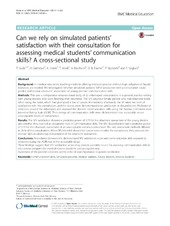| dc.contributor.author | Gude, Tore | en_US |
| dc.contributor.author | Grimstad, Hilde | en_US |
| dc.contributor.author | Holen, Are | en_US |
| dc.contributor.author | Anvik, Tor | en_US |
| dc.contributor.author | Bærheim, Anders | en_US |
| dc.contributor.author | Fasmer, Ole Bernt | en_US |
| dc.contributor.author | Hjortdahl, Per | en_US |
| dc.contributor.author | Vaglum, Per Jørgen Wiggen | en_US |
| dc.date.accessioned | 2016-06-08T07:49:07Z | |
| dc.date.available | 2016-06-08T07:49:07Z | |
| dc.date.issued | 2015-12-18 | |
| dc.Published | BMC Medical Education 2015, 15:225 | eng |
| dc.identifier.issn | 1472-6920 | |
| dc.identifier.uri | https://hdl.handle.net/1956/12080 | |
| dc.description.abstract | Background. In medical education, teaching methods offering intensive practice without high utilization of faculty resources are needed. We investigated whether simulated patients’ (SPs’) satisfaction with a consultation could predict professional observers’ assessment of young doctors’ communication skills. Methods. This was a comparative cross-sectional study of 62 videotaped consultations in a general practice setting with young doctors who were finishing their internship. The SPs played a female patient who had observed blood when using the toilet, which had prompted a fear of cancer. Immediately afterwards, the SP rated her level of satisfaction with the consultation, and the scores were dichotomized into satisfaction or dissatisfaction. Professional observers viewed the videotapes and assessed the doctors’ communication skills using the Arizona Communication Interview Rating Scale (ACIR). Their ratings of communication skills were dichotomized into acceptable versus unacceptable levels of competence. Results. The SPs’ satisfaction showed a predictive power of 0.74 for the observers’ assessment of the young doctors and whether they reached an acceptable level of communication skills. The SPs’ dissatisfaction had a predictive power of 0.71 for the observers’ assessment of an unacceptable communication level. The two assessment methods differed in 26 % of the consultations. When SPs felt relief about their cancer concern after the consultation, they assessed the doctors’ skills as satisfactory independent of the observers’ assessment. Conclusions. Accordance between the dichotomized SPs’ satisfaction score and communication skills assessed by observers (using the ACIR) was in the acceptable range. These findings suggest that SPs’ satisfaction scores may provide a reliable source for assessing communication skills in educational programs for medical trainees (students and young doctors). Awareness of the patient’s concerns seems to be of vital importance to patient satisfaction. | en_US |
| dc.language.iso | eng | eng |
| dc.publisher | BioMed Central | eng |
| dc.rights | Attribution CC BY 4.0 | eng |
| dc.rights.uri | http://creativecommons.org/licenses/by/4.0 | eng |
| dc.subject | Communication skills | eng |
| dc.subject | Simulated patients | eng |
| dc.subject | Medical trainees | eng |
| dc.subject | Young doctors | eng |
| dc.subject | Medical students | eng |
| dc.title | Can we rely on simulated patients' satisfaction with their consultation for assessing medical students' communication skills? A cross-sectional study | en_US |
| dc.type | Peer reviewed | |
| dc.type | Journal article | |
| dc.date.updated | 2016-02-17T10:15:54Z | |
| dc.description.version | publishedVersion | en_US |
| dc.rights.holder | Copyright Gude et al. 2015 | |
| dc.identifier.doi | https://doi.org/10.1186/s12909-015-0508-x | |
| dc.identifier.cristin | 1303201 | |
| dc.subject.nsi | VDP::Medisinske Fag: 700 | en_US |

